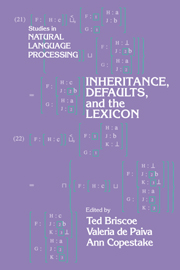Book contents
- Frontmatter
- Contents
- Contributors
- 1 Introduction
- 2 Skeptical and Credulous Default Unification with Applications to Templates and Inheritance
- 3 Prioritised Multiple Inheritance in DATR
- 4 Some Reflections on the Conversion of the TIC Lexicon into DATR
- 5 Norms or Inference Tickets? A Frontal Collision between Intuitions
- 6 Issues in the Design of a Language for Representing Linguistic Information Based on Inheritance and Feature Structures
- 7 Feature-Based Inheritance Networks for Computational Lexicons
- 8 A Practical Approach to Multiple Default Inheritance for Unification-Based Lexicons
- 9 The ACQUILEX LKB: An Introduction
- 10 Types and Constraints in the LKB
- 11 LKB Encoding of Lexical Knowledge
- 12 Defaults in Lexical Representation
- 13 Untangling Definition Structure into Knowledge Representation
- Appendix A A Bibliography of ACQUILEX Papers Connected with the LKB
- Appendix B The LKB Description Language Syntax
- Appendix C Software Availability
- References
- Author index
- Subject Index
3 - Prioritised Multiple Inheritance in DATR
Published online by Cambridge University Press: 01 April 2010
- Frontmatter
- Contents
- Contributors
- 1 Introduction
- 2 Skeptical and Credulous Default Unification with Applications to Templates and Inheritance
- 3 Prioritised Multiple Inheritance in DATR
- 4 Some Reflections on the Conversion of the TIC Lexicon into DATR
- 5 Norms or Inference Tickets? A Frontal Collision between Intuitions
- 6 Issues in the Design of a Language for Representing Linguistic Information Based on Inheritance and Feature Structures
- 7 Feature-Based Inheritance Networks for Computational Lexicons
- 8 A Practical Approach to Multiple Default Inheritance for Unification-Based Lexicons
- 9 The ACQUILEX LKB: An Introduction
- 10 Types and Constraints in the LKB
- 11 LKB Encoding of Lexical Knowledge
- 12 Defaults in Lexical Representation
- 13 Untangling Definition Structure into Knowledge Representation
- Appendix A A Bibliography of ACQUILEX Papers Connected with the LKB
- Appendix B The LKB Description Language Syntax
- Appendix C Software Availability
- References
- Author index
- Subject Index
Summary
Abstract
We characterise a notion of prioritised multiple inheritance (PMI) and contrast it with the more familiar orthogonal multiple inheritance (OMI). DATR is a knowledge representation language that was designed to facilitate OMI analyses of natural language lexicons: it contains no special purpose facility for PMI and this has led some researchers to conclude that PMI analyses are beyond the expressive capacity of DATR. Here, we present three different techniques for implementing PMI entirely within DATR's existing syntactic and semantic resources. In presenting them, we draw attention to their respective advantages and disadvantages.
Introduction
‘Multiple inheritance’, in inheritance network terminology, describes any situation where a node in an inheritance network inherits information from more than one other node in the network. Wherever this phenomenon occurs there is the potential for conflicting inheritance, i.e. when the information inherited from one node is inconsistent with that inherited from another. Because of this, the handling of multiple inheritance is an issue which is central to the design of any formalism for representing inheritance networks. For the formalism to be sound, it must provide a way of avoiding or resolving any conflict which might arise. This might be by banning multiple inheritance altogether, restricting it so that conflicts are avoided, providing some mechanism for conflict resolution as part of the formalism itself, or providing the user of the formalism with the means to specify how the conflict should be resolved.
- Type
- Chapter
- Information
- Inheritance, Defaults and the Lexicon , pp. 38 - 46Publisher: Cambridge University PressPrint publication year: 1994



